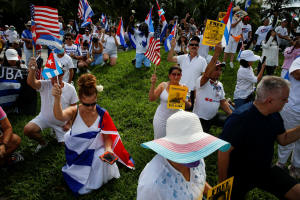Cuban Americans rally in Miami while protest plans fizzle in Havana
 Send a link to a friend
Send a link to a friend
 [November 15, 2021]
By Brian Ellsworth and Marc Frank [November 15, 2021]
By Brian Ellsworth and Marc Frank
MIAMI/HAVANA (Reuters) -Cuban Americans in
Miami held rallies and led prayers to support dissidents on the
Communist-run Caribbean island whose planned protests on Sunday largely
fizzled under pressure from authorities and government supporters.
Dissidents in Cuba have for months been preparing a "Civic March for
Change" in support of civil and human rights following nationwide
protests in July, the largest on the island since Fidel Castro's 1959
revolution. Rights groups say more than 1,000 people were detained
following those rallies and hundreds remain in jail.
The government of President Miguel Diaz-Canel has prohibited Monday's
march in Havana as well as protests planned for other Cuban cities,
saying they are part of a destabilization campaign by the United States,
which maintains a Cold War-era embargo on Cuba. U.S. officials have
denied the allegations.
Demonstrators clad in white to show support for Cuban dissidents
gathered in a park on Sunday in eastern Miami shouting protest slogans
"Patria y Vida" and "Viva Cuba Libre," while a small flotilla of boats
touting Cuban flags gathered nearby.

“Today's activity is more than anything else moral support for our
people ... to show them that they are not alone," said Niurka Prestamo,
a 45-year-old realtor who attended the demonstration.
The rally in Miami took place around the same time as Yunior Garcia, a
playwright and dissident leader, was expected to march alone, with a
white rose in hand, down a central street in Havana to underscore the
non-violent nature of his movement.
But government supporters surrounded Garcia's apartment complex early in
the afternoon, and shortly after draped the building in Cuban flags,
obscuring the view of Garcia's window from the street.
A bus blocked access to Garcia's street, and supporters shouting "I am
Fidel" - a reference to the late Cuban leader Fidel Castro - gathered
around his home, preventing him from leaving.
Later in the evening, dissidents had called on supporters to bang pots
from their homes in a show of solidarity for government critics, but
several Reuters witnesses in Havana, the country's largest city, heard
no pot-banging in their neighborhoods.
Residents contacted by Reuters in eastern Granma and Santiago de Cuba
provinces, as well as San Antonio de los Banos, in Artemisa province
where the July protests began, also reported no incidents on Sunday and
no pot-banging.
[to top of second column]
|

People attend a rally ahead of an opposition demonstration in Cuba,
in Miami, Florida, U.S. November 14, 2021. REUTERS/Marco Bello

U.S. Secretary of State Antony Blinken on Sunday condemned "intimidation
tactics" by the Cuban government ahead of Monday's planned march in Cuba
and vowed the United States would pursue measures seeking
"accountability" for the crackdown.
Cuban Foreign Minister Bruno Rodriguez replied on
Twitter shortly after, telling the United States to stay out of
Cuban affairs.
"Antony Blinken should learn once and for all that the Cuban
government's sole duty is to its people and rejects, on its behalf,
the U.S. interference," Rodriguez said.
A Facebook group called Archipielago, led by Garcia, is at the front
of Monday's planned protests - which coincide with Cuba's reopening
of its borders to tourism following restrictions tied to the
COVID-19 pandemic.
Archipielago says it has 31,500 members, more than half of whom are
inside Cuba. The group in September sought official permission for
the march, which was quickly denied.
Miami has the United States' largest Cuban-American population,
which grew in the years after the 1959 revolution.
About a quarter of Archipielago's members live in the United States,
the group says, including 1,200 in Miami.
The city was a hotbed of anti-Castro conspiracy efforts during the
Cold War, and its Cuban-American residents as a group remain
staunchly opposed to the Havana government, although some in the
younger generation have sought to re-establish connections in recent
years with the island.
"We are here to give a cry of freedom. We want to tell the people
that they are not alone," said Miami demonstrator and journalist
Serafin Moran, 43. "Today we send a greeting, a message to the
people of Cuba: If you are in the streets, so are we."
Small rallies in support of the Cuban dissidents took place in other
cities across the globe on Sunday, from Canada to Spain.
(Reporting by Brian Ellsworth in Miami, Marc Frank in Havana and
Matt Spetalnick in Washington; Editing by Dave Sherwood and Peter
Cooney)
[© 2021 Thomson Reuters. All rights
reserved.] Copyright 2021 Reuters. All rights reserved. This material may not be published,
broadcast, rewritten or redistributed.
Thompson Reuters is solely responsible for this content.
 |